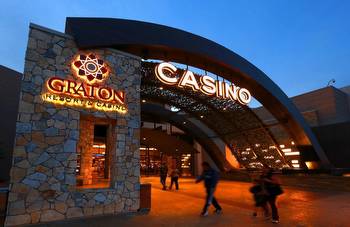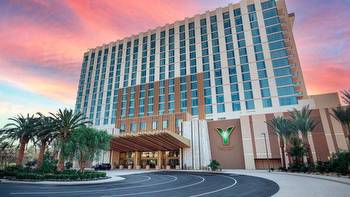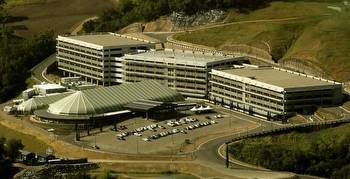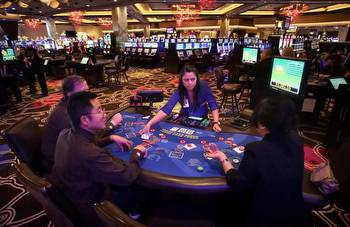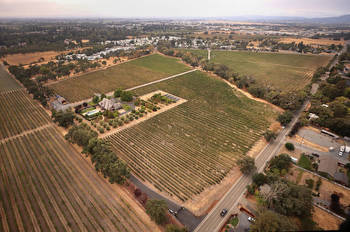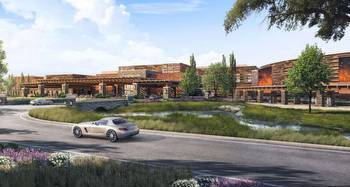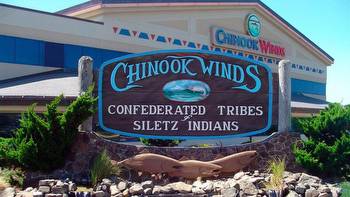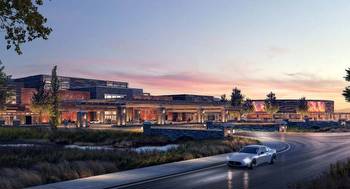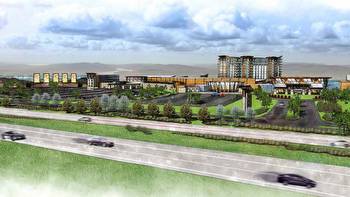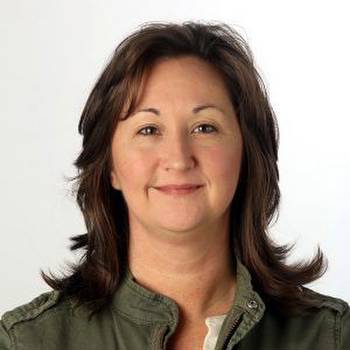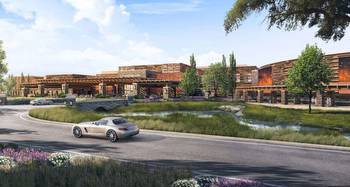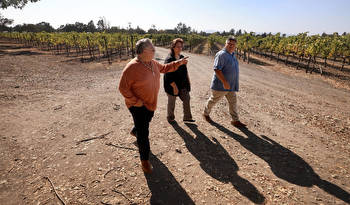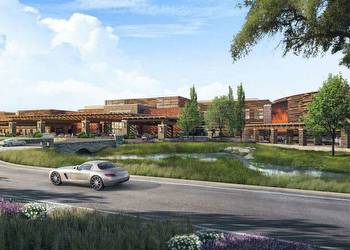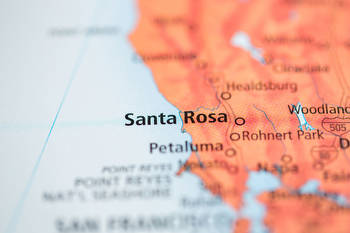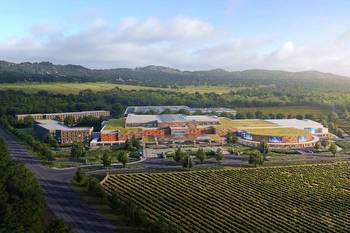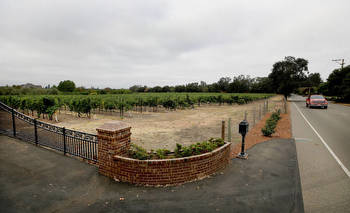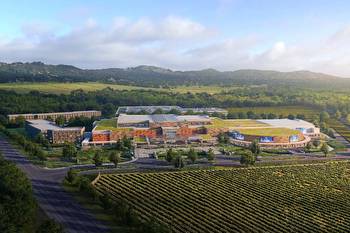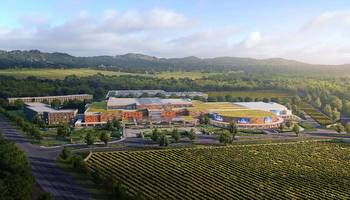Federal hearing on proposed Koi Nation casino near Windsor draws scores of detractors
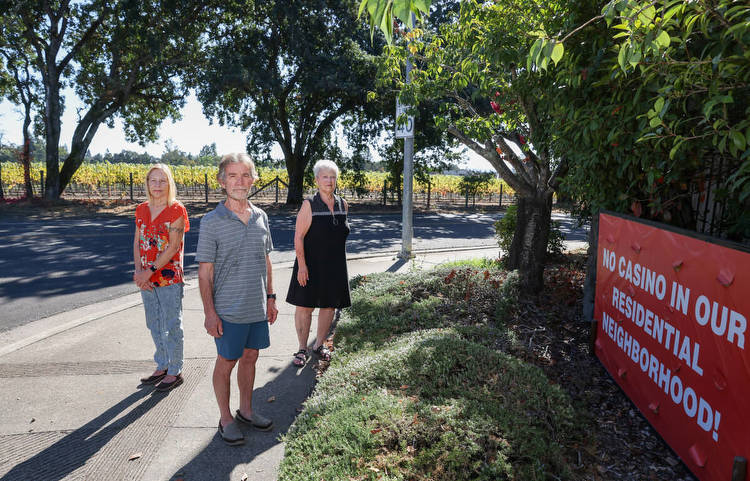
It didn’t take long to get to the heart of the debate Wednesday night in a closely watched federal hearing on a large tribal casino proposed near Windsor.
The public comments began with Dino Beltran, vice chairman of the Koi Nation. Beltran spoke of the forced displacement and resource deprivation that drove his people from their ancestral home in Lake County, and the cultural revival and financial lifeline they might gain from casino ownership.
“Tonight’s hearing is not required by federal law,” he said. “But the nation believed it is important for the public to have the opportunity to put its views on record.”
Next on the Zoom feed was Greg Sarris, chairman of the Federated Indians of Graton Rancheria, who own the Bay Area’s largest casino and gaming destination outside Rohnert Park.
Sarris offered a very different assessment of a proposed casino-resort in unincorporated Sonoma County, noting what many others would echo that night — that the Koi Nation should not be afforded this opportunity, because that tribe is not indigenous to Sonoma County at all.
“Their proposed site here is 49 miles from their original reservation,” Sarris said. “And never, never has the Department of Interior taken restored lands into trust that far — never farther than 15 miles from their original rancheria.”
They were the first statements among dozens Wednesday night, during an online public forum hosted by the federal Bureau of Indian Affairs. It was meant to allow community comment on a proposed gaming facility and hotel on 68.6 acres in the rural, upscale Shiloh neighborhood just southeast of Windsor.
Stiff opposition to the Koi project emerged as soon as the tribe announced its $12.3 million land purchase two years ago. And the argument sprang to life again Sept. 12, when the Bureau of Indian Affairs released an environmental study prepared by El Dorado Hills-based Acorn Environmental.
That assessment, a requirement of the federal process regulating Indian gaming developments, examines four alternatives. One of those is a “no action” option that would preserve the vineyards and oak trees currently on the property, at the corner of Shiloh Road and Old Redwood Highway.
The alternative preferred by the Koi tribe advances the worst fears ofmany residents living adjacent to the parcel.
It calls for a 540,000-square-foot casino with 2,750 gaming machines, five restaurants, five bars, a coffee shop, a 2,800-seat event center and two ballrooms, plus an adjacent 400-room hotel and spa. This plan would include more than 5,000 parking spaces.
A so-called “reduced intensity alternative” is nonetheless substantial: a casino of just over 400,000 square feet (with the same number of gaming machines), featuring similar amenities but minus the event center; a 200-room hotel — not as tall as the Alternative A structure — and just under 4,500 parking spaces.
Some Windsor residents are advocating for Alternative C, the “nongaming alternative.” That one would allow the Koi a 200-room hotel and a 25,000-square-foot winery and event center, but no slots or gaming tables.
Others insist the only reasonable plan for the site is no development at all, and they turned out in force for Wednesday’s hearing.
Online speakers variously referred to the Koi project, and to the environmental assessment that downplayed its impacts, as “ludicrous,” “mind boggling,” “ridiculous” and “a joke.” They raised many of the concerns that have echoed since September 2021, including traffic, noise, crime, property values and the effect on the local water table of pumping nearly 280,000 gallons of water from the ground each day.
But the specter raised again and again by speakers was the lack of evacuation capacity during wildfires.
“If you aren’t moved by water, traffic, schools, churches, wildlife, the creek, maybe you would be moved by death,” said Heidi Jacquin, who lost her home in the Tubbs Fire in 2017 and now lives in Shiloh Estates. “People burning to death in their homes, burning to death in their cars.”
The uproar is reminiscent of the controversy that dogged Graton Rancheria for more than a decade as it pushed for its casino. That drama included an investor declaring bankruptcy, accusations of harm to the endangered tiger salamander, two lawsuits and an attempted recall of Rohnert Park council members who supported the project.
In the end, Sarris’ tribe prevailed, opening their Las Vegas-style casino and resort to much fanfare in late 2013. The Koi Nation’s path could be equally fraught.
On Tuesday, a day before this week’s hearing, Lynda Williams and Don Ziskin — both residents of the Esposti Park neighborhood just north of the proposed casino site — walked a reporter to the intersection of Shiloh Road and Gridley Drive.
It was a relatively quiet setting on a beautiful early-fall day. If the Koi plan becomes reality, this will become a major, light-controlled intersection leading into the resort.
“We wouldn’t like it if it was an Amazon warehouse, either,” Williams said.
Ziskin, who has lived in the neighborhood for 31 years, recalled his kids “polliwogging” in Pruitt Creek, which cuts through the Koi property. His family used to take its Christmas photos there.
A retired attorney, Ziskin has big problems with Acorn Environmental’s report, which examined several potential concerns but judged that, with offsets, each one would have “less than significant” impacts.
For example, the assessment cites three other Northern California casinos as comparable cases. But when Ziskin looked them up on Google Maps, he said, he quickly saw that none of them have direct access from residential neighborhoods. He doesn’t like the traffic study, either. Ziskin said monitors came out on a Saturday and Monday in wintry January, when traffic was minimal — no comparison to rush hour on a summer Friday.
“As a lawyer, I would love to argue against this,” Ziskin said.
The Koi had advocates at the hearing, too.
Virtually all of them were members of the Northern California Carpenters Union, which signed an agreement with the tribe in February 2022 ensuring any general contractor selected for the project will employ union labor.
Those workers stressed the estimated 1,600 full-time jobs the project would generate during construction, and 2,200 permanent local jobs once the resort is up and running, in Alternative A.
A marketing director for the Koi’s announced partner in operating the casino, the powerful Chickasaw Nation of Oklahoma, also spoke on behalf of the project. “We have a deep regard to listen and work with the community,” Sean Boyd said.
That last assertion is disputed by several Shiloh neighbors who insisted they have never been approached by Koi tribal leadership. At least one informal community meeting was recently discussed, but failed to come together.
Otherwise, the opposition appears largely stacked against the Koi casino. It is objected to by seemingly every political entity that has weighed in. That includes the Sonoma County Board of Supervisors, the Windsor Town Council, state Sen. Mike McGuire, Reps. Jared Huffman and Mike Thompson, and Sens. Dianne Feinstein and Alex Padilla.
Speakers participating via Zoom on Wednesday night included representatives for Feinstein and Huffman, Windsor Mayor Rosa Reynoza and Vice Mayor Sam Salmon, Sonoma County Chief Deputy Counsel Jennifer Klein, Chairman Chris Wright of the Dry Creek Rancheria — owners of River Rock Casino, Sonoma County’s first tribal gaming destination — former Windsor Mayor Robin Goble and retired Santa Rosa Chief of Police Hank Schreeder.
All voiced opposition or concern about the casino project.
In effect, the Koi’s bid to develop their acreage will stand as a test of a convoluted process, in which local constituents are invited to weigh in but decisions are ultimately made at the federal level.
The 45-day public comment period for the Koi environmental assessment will end Oct. 27. Several speakers Wednesday, including Sarris, urged the Bureau of Indian Affairs to extend that period by 60 days.
Once it closes, the Bureau will consider the environmental document, weigh comments and formulate responses, and decide whether to issue a finding of no significant impact or initiate the preparation of a rigorous environmental impact statement.
Federal criteria require regulators to consider local impacts and community sentiment in making their final decision. The U.S. Secretary of Interior has final say.
The Koi people hope that after all of those steps, the Department of Interior will approve an agreement that sets their acreage aside as sovereign territory and paves the way for a thriving casino and hotel.
A gaming compact would still be needed from the state. Local officials in past cases have used that step, with built-in revenue sharing provisions to offset local impacts, to elicit additional commitments from tribes.
Still, the jittery neighbors of Shiloh know they are running out of chances to get their points across.
“I have hope-slash-faith,” Ziskin said. “If the BIA were to reach out and look at community support, they would not find any.”








